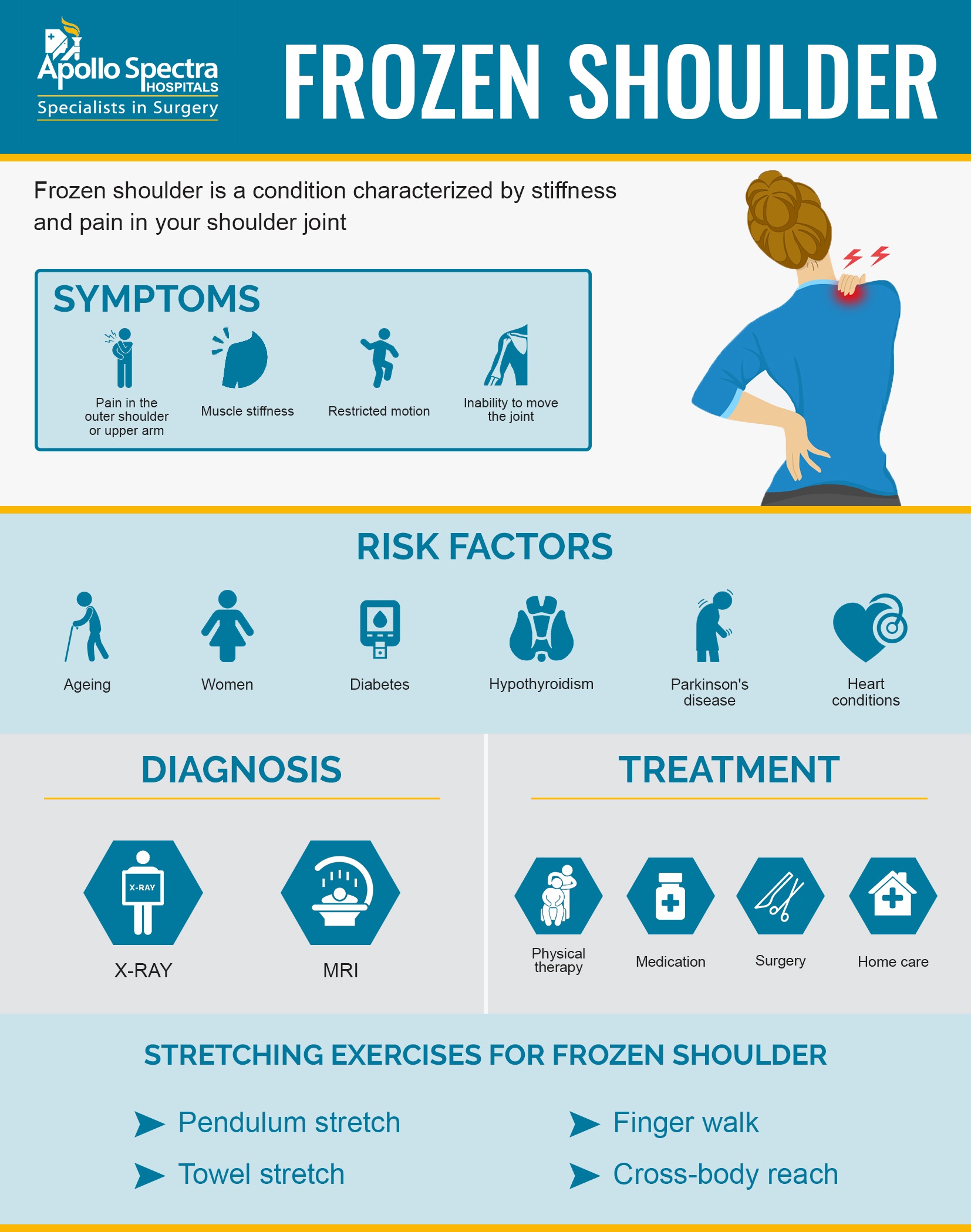Ignoring Frozen Shoulder
March 4, 2020

Have you been facing difficulties with basic tasks like reaching an upper cabinet or putting on your shirt?
Has the pain deteriorated in recent times?
Have you been waking up every night due to pain? If so, you might be having a frozen shoulder.
Adhesive Capsulitis, more commonly known as a frozen shoulder, is a condition that causes stiffness and pain in the shoulder joint. The common signs of the condition are a limited range of motion for active and passive movement of the shoulder.
When you knowingly put in the effort for moving your shoulder, it is known as an active range of motion. Passive range of motion involves movement of the shoulder with the muscles being relaxed. Other common conditions related to the shoulder include tendinitis, bursitis and impingement. These conditions cause pain and inhibit active range of motion with the passive range of motion being normal. In the case of a frozen shoulder, the joint itself becomes stiff, thus limiting both passive and active range of motion.
Who is affected by a frozen shoulder?
Around 5% of people are affected by frozen shoulder. This increases to 38% for people having thyroid disease and diabetes. Generally, people between the age of 45-65 are affected by the condition. Females are more likely to be affected by frozen shoulders than men. In 14% of the cases, both the shoulders freeze at the same time. When one shoulder is affected, the other shoulder is 34% more likely to be affected as well at some point in time.
How does it occur?
It is not completely understood what actually causes a frozen shoulder pain. However, it is often linked to injuries that cause inflammation. If you have inflammation caused by a minor injury, the levels of Cytokine in your blood increase to help with the injury repair. As a result, the inflammation might be exaggerated, which can cause more pain. Stiffness can occur if this continues to happen.
The frozen shoulder might also be caused by the shoulder being immobile for long periods after a surgery or an injury. After surgery or a fracture, you are required to use a sling for immobilizing your shoulder for around 6 weeks. The shoulder joint may become stiff during this period.
While these are common causes of frozen shoulder, it is also not uncommon for people to have this condition without any evident cause. It may end up happening out of nowhere. In that case, it is not possible to prevent a frozen shoulder. In general, however, to prevent a frozen shoulder from occurring, it is important to keep your shoulder moving.
Usually, frozen shoulder tends to last for around 30 months and takes place in three phases:
- Freezing: You will experience more stiffness and pain during this phase.
- Frozen: The pain might reduce during this phase but the stiffness persists
- Thawing: This phase involves the shoulder gradually regaining its range of motion. This is the longest-lasting phase of frozen shoulder.
What should you do?
If you are looking for an instant fix for the condition, there isn’t one. You may try passive treatment options like ice, heat, ultrasound and electrical stimulation.
The range of motion and pain should improve over time if you stretch regularly. However, stretching aggressively may end up making things worse, depending on how irritable you feel. Hence, it is important that you stretch gradually. If you experience severe pain, you should begin with low intensity stretches at first. You may increase the duration and intensity of stretches as you begin tolerating it over time. It is advisable to stretch as frequently as you can, at least 3 times a day. However, you should also give consideration to how you feel. If you experience too much pain, stretch only as much as you can tolerate.
Joint mobilization can also improve the function and motion of a frozen shoulder. However, you will find it hard to do it by yourself. You would need the help of a physical therapist for it. Even if you are just stretching on your own, the condition is likely to improve. So, you may not need to undergo physical therapy as long as you are stretching appropriately.
Joint mobilization can also improve the function and motion of a frozen shoulder. However, you will find it hard to do it by yourself. You would need the help of a physical therapist for it.
Our Doctors
DR. ANKUR SINGH
MBBS, D.Ortho, DNB -...
| Experience | : | 11 Yeras Experience |
|---|---|---|
| Speciality | : | Orthopaedics and Tra... | Location | : | NSG Chowk |
| Timings | : | Mon - Sat : 10:00 A... |
NOTICE BOARD
CONTACT US
CONTACT US
 Book Appointment
Book Appointment



.svg)
.svg)
.svg)
.svg)








